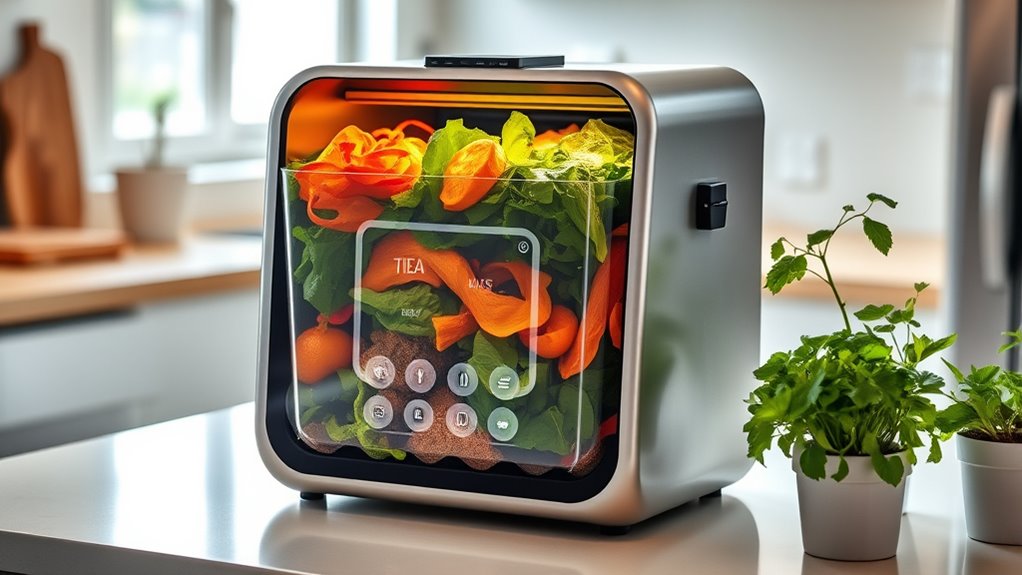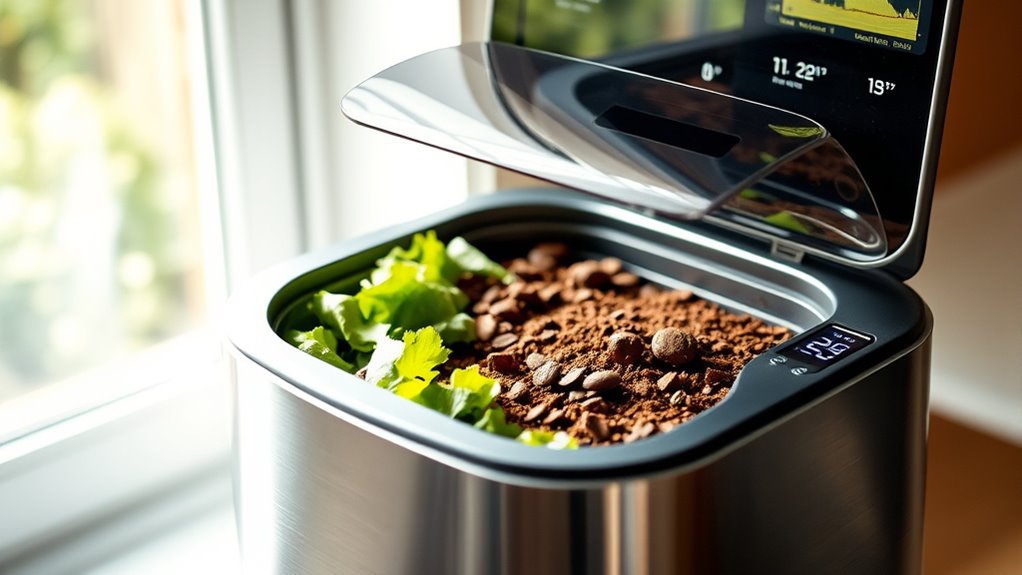Smart composting systems make turning your kitchen waste into fertilizer simple, efficient, and mess-free. They use advanced sensors and automation to optimize airflow, moisture, and temperature, ensuring fast and odorless composting with minimal effort. These systems are designed for easy use in small spaces, making organic recycling accessible to everyone. By keeping conditions ideal for aerobic bacteria and worms, they’ll help you produce rich compost effortlessly. To discover how these smart solutions work, there’s more to explore.
Key Takeaways
- Smart composting systems automate waste decomposition, converting kitchen scraps into nutrient-rich fertilizer efficiently.
- They utilize sensors and controls to optimize oxygen, moisture, and temperature for ideal composting conditions.
- Incorporating worm composting speeds up waste breakdown, producing high-quality castings for soil enrichment.
- Compact, user-friendly designs make it easy for homeowners to recycle organic waste indoors or in small spaces.
- These systems promote sustainable waste management, reduce odors, and support healthy gardening practices.

Smart composting systems are revolutionizing how you recycle organic waste by making the process easier, faster, and more efficient. Instead of dealing with messy piles or complicated setups, these systems harness innovative technology to turn your kitchen scraps into nutrient-rich fertilizer effortlessly. One popular method they often incorporate is worm composting, which uses specific worms to break down food waste naturally. Worm composting is highly effective because it relies on aerobic decomposition—a process that requires oxygen to efficiently decompose organic material. By maintaining proper airflow and moisture levels, smart systems optimize aerobic decomposition, ensuring your waste turns into compost quickly and with minimal smell or pests.
With traditional composting, it’s easy to forget to turn the pile or to create conditions that favor anaerobic bacteria, which produce unpleasant odors. Smart composting systems eliminate these issues by automating aeration and monitoring moisture levels. They typically include sensors that detect temperature, humidity, and oxygen, adjusting airflow or mixing as needed. This keeps the compost in the ideal state for aerobic decomposition, accelerating the process while reducing odors. The incorporation of worm composting within these systems also speeds things up since worms thrive in oxygen-rich environments and efficiently convert organic waste into castings, which are a fantastic soil amendment.
Using a smart system means you don’t have to be an expert in composting to achieve excellent results. The technology guides you through the process, alerting you when to add new waste, when to harvest finished compost, or if conditions need adjustment. This hands-free approach helps you avoid common pitfalls like overfeeding or under-oxygenating the compost. Plus, many systems are designed to be compact and discreet, fitting comfortably into your kitchen or small yard, making composting accessible regardless of space constraints. Additionally, understanding composting techniques can help you maximize nutrient recovery and reduce waste even further.
Frequently Asked Questions
How Much Space Is Needed for a Smart Composting System?
You’ll need about 2 to 4 square feet for a smart composting system, depending on its size and your waste volume. Its compact design fits well in small spaces, making it ideal for apartments or limited yards. Plus, many models offer scalability options, so you can expand as your composting needs grow. This way, you optimize space while efficiently turning kitchen waste into fertilizer.
Can Smart Composters Handle Non-Food Waste?
Think of a smart composter as a versatile gardener, ready to embrace various materials. Yes, it can handle non-food waste like paper and yard clippings, but beware of composting limitations. Some systems may struggle with heavy or greasy non-food waste, slowing down the process or causing odors. To keep things running smoothly, stick to recommended non-food items and avoid overloading, ensuring your compost stays healthy and productive.
What Is the Lifespan of a Typical Smart Composting Device?
A typical smart composting device usually lasts around 3 to 5 years, depending on device durability and how well you maintain it. Regularly cleaning and following the composting cycle can extend its lifespan, ensuring it functions efficiently. While some models have replaceable parts, overall, proper care helps maximize your device’s longevity, so it continues turning your kitchen waste into rich fertilizer for years to come.
Are There Any Odor Issues With Smart Composting Systems?
You won’t experience significant odor issues with smart composting systems because they feature built-in odor control and smell prevention mechanisms. These systems often use sealed lids, activated carbon filters, or aeration technology to keep unpleasant smells at bay. Regularly managing moisture levels and mixing waste helps prevent odors from developing. Overall, with proper use, smart composters maintain a fresh environment and minimize any potential smell concerns.
How Much Maintenance Is Required for These Systems?
You’ll find that maintenance frequency for smart composting systems is minimal, usually requiring you to check the system once a week. Regular troubleshooting tips include monitoring for odors, ensuring proper aeration, and emptying the compost bin when full. Most systems have user-friendly interfaces that alert you to issues, making upkeep straightforward. Overall, with just a little attention, you’ll keep your smart composting system running smoothly and efficiently.
Conclusion
Think of your smart composting system as a gardener’s magic wand, transforming your kitchen waste into rich, nourishing fertilizer with ease. By embracing this technology, you’re turning everyday scraps into nature’s gold, fueling a vibrant garden that blooms and thrives. It’s like planting seeds of sustainability right in your home, making every peel and scrap a step toward a greener future. With this system, you’re not just composting—you’re nurturing the earth, one kitchen waste at a time.









